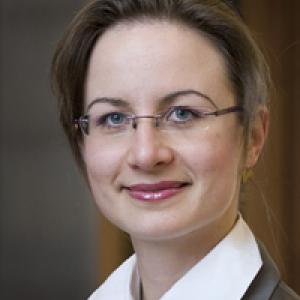Prof. Freya Baetens has been awarded a Francqui Chair
Associated people
Prof. Freya Baetens has been awarded a Chair by the Francqui Foundation in Belgium. A Francqui Chair is conferred after a highly competitive process in which any scholar, anywhere in the world, within any field or discipline, can be nominated by Belgian universities based on outstanding academic merit, including the impact of one's scholarship on the world. Prof. Baetens has been presented with this Chair on the basis of her work's influence on law- and policy-making in Europe and beyond.
History
When the First World War erupted in 1914, most of Belgium’s territory was occupied by the German armed forces and the Belgian population was threatened with famine. A large-scale expression of generosity led to the establishment of the Commission for Relief in Belgium, chaired by US President Herbert Hoover. Funds collected in different countries, including the United States, facilitated the transport of food and basic necessities to Belgium via the Netherlands, which had remained neutral in the conflict.
In search of a strong partner in Belgium, Herbert Hoover remembered Belgian statesman and visionary philanthropist Emile Francqui, who, during his days as Belgian consul in China, had been a formidable competitor for Hoover when they both participated in the negotiation of the Beijing-Hankou railway network. On Hoover’s request, Francqui organized the National Committee for Aid and Food during the First World War, responsible for receiving aid from abroad, and distributing it to the population.
This National Committee functioned until the end of the war. At that time, the Commission for Relief in Belgium still had significant sums at its disposal so Emile Francqui and Herbert Hoover decided to dedicate these to the reconstruction of Belgium. In their view, the best investment was to focus on university level education and research. As a result, the University Foundation was founded in Brussels (in 1920), the Belgian American Educational Foundation (BAEF) in New York (in 1920) and the National Fund for Scientific Research in Brussels (in 1928).
Mission and governance
To promote the development of top-level higher education and scientific research, Francqui and Hoover decided to jointly set up a foundation: the Francqui Foundation was formally established by Royal Decree on 25 February 1932. Emile Francqui died on 18 November 1935. Today his legacy endures in various forms as a testament to the power of his vision, dedication, and philanthropy. The current Chairman of the Board of Directors is Count Herman Van Rompuy, inaugural President of the European Council, Minister of State of Belgium and President of the Administrative Council of the College of Europe.
The Francqui Chairs
The Francqui Chairs, existing since 1933, form one of the cornerstone initiatives of the Foundation. These prestigious Chairs encourage international inter-university scientific cooperation and exchange to enrich academic environments, advance academic excellence and interdisciplinary research, and strengthen universities’ reputations. The inaugural lesson of a new Francqui Chair serves as an opportunity to bring together outstanding international experts of the discipline concerned.
The Francqui laureates not only contribute to ongoing research but also act as a source of inspiration for students and faculty. Several Nobel Prize winners have also been recipients of a Francqui chair, including Jean-Pascal van Ypersele (vice-chair of the Intergovernmental Panel on Climate Change – 2007 Nobel Peace Prize), Christian de Duve and Albert Claude (Joint 1975 Nobel Prize for Medicine) and Ilya Prigogine (1977 Nobel Prize in Chemistry). By inviting eminent experts from around the world to engage with the local academic community, the Foundation elevates the standard of higher education in Belgium and catalyzes encounters between distinguished figures in the particular field of research.
Freya Baetens as a Francqui laureate
The Francqui Chair is not Prof. Freya Baetens’ first brush with the legacy of Emile Francqui: she previously obtained a BAEF grant to pursue her LLM studies at the University of Columbia and she chairs the panel for legal sciences and criminology of the Flemish Fund for Scientific Research (FWO - together with the Brussels-Wallonian Fund for Scientific Research or FNRS – the successor of the National Fund for Scientific Research).
Prof. Freya Baetens is only the seventh Oxford scholar to hold a Francqui Chair in nearly 100 years: previous holders are Norman March (Coulson Professor of Theoretical Chemistry; Fellow of University College), Tim Schwanen (Professor of Transport Studies and Geography; Fellow of St Anne’s College), Carol Harrison (Lady Margaret Professor of Divinity; Canon of Christ Church Cathedral), Tom Snijders (Professor of Methodology and Statistics; Fellow of Nuffield College), Stephan Dercon (Professor of Economic Policy; Fellow of Jesus College) and Paul Davies (Professor of Corporate Law; Fellow of Harris Manchester College).
Prof. Baetens has chosen the following theme for her lecture series: Challenging Common Conceptions of Public International Law. The aim is to transcend the fragmentation of international law by elucidating and scrutinising fundamental ideas shared by different sub-fields of public international law, including economic law, human rights law and law of the sea.


